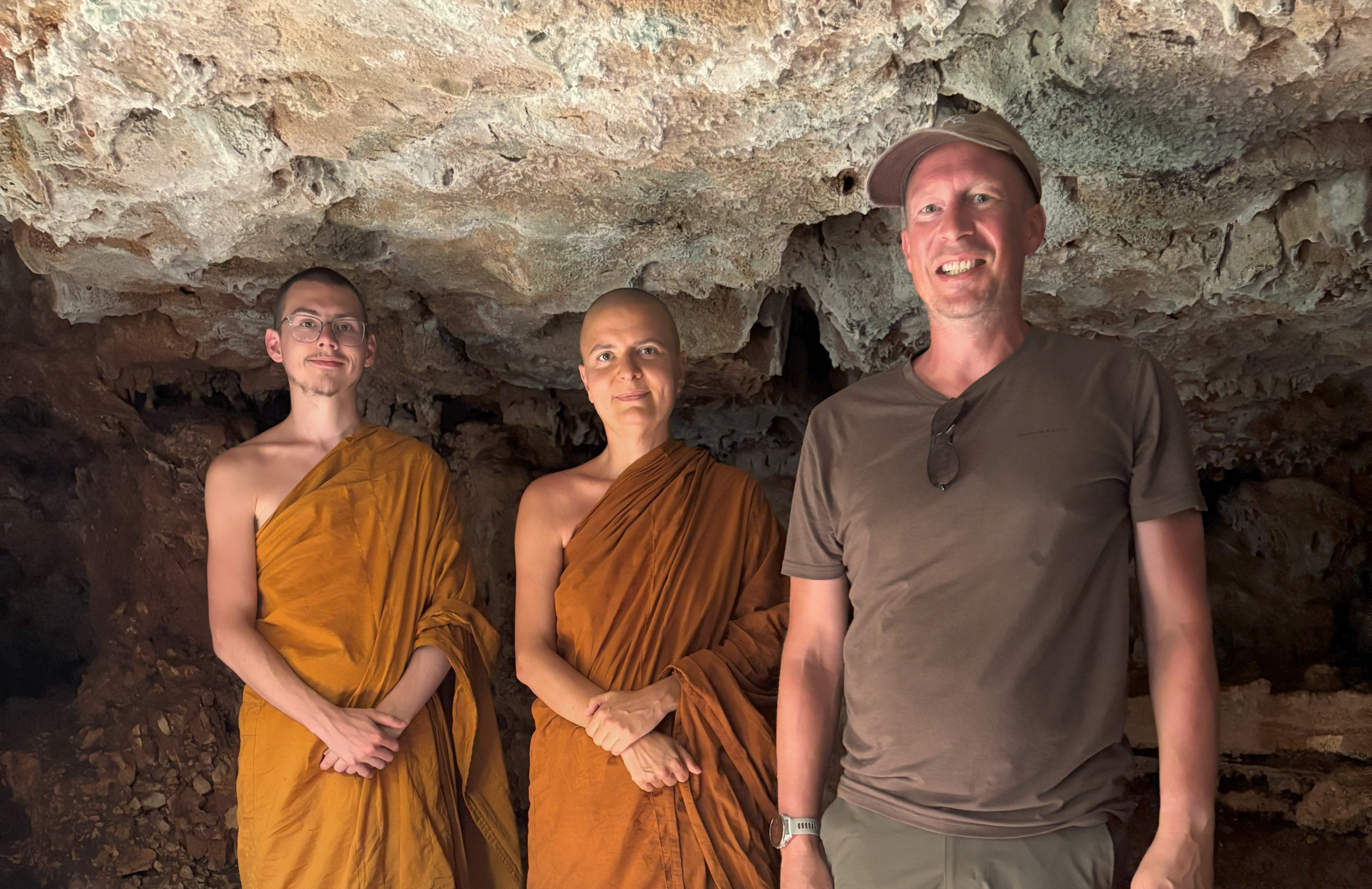This year’s vacation was to be spent with my brother in Italy. We both love the mountains and the goal was the Dolomites. Since my brother could only be with me for the first week, I wondered what I would do after he had gone home to Norway. Once I was in the Dolomites, I wanted to stay behind and hike in the mountains for at least another week. During the planning, I happened to see in a newsletter that several of the monastics from Buddhist Insights/Empty Cloud were now in southern Italy where they are in the start-up phase of a new vihara (facilities for Buddhist monastics) for both women and men (called bhikkhunis and bhikkhus respectively in the ancient Buddhist scriptures). I sent them an email to find out if they had any volunteer work for me and got the answer that I was most welcome to visit. I knew a little about Empty Cloud from before as they have a YouTube channel with lots of high-quality content that I had visited from time to time and was looking forward to visiting them, as well as experiencing the culture of southern Italy up close. Equality for monastics has long been a matter close to my heart and I have supported viharas with bhikkhunis in the United States, Europe and Asia both financially and by visiting them.
Fast forward to the end of August and the action vacation in the Dolomites was over. Now it was going to be good to get down a bit in the last week of the holiday, both literally and mentally. From Bari, it was only half an hour’s drive to Acquavia delle Fonti, where Empty Cloud is located. The trip went in rural surroundings with grape vines and olive groves on all sides. Often the sweet smell of walnut trees was also felt with ripe fruit. The traffic was, as elsewhere in Italy, a little more angry and chaotic than in Norway, but it has its own logic that you learn quite quickly. Since Lena Bhavana, the vihara where I was supposed to work, was a 25-minute bike ride from the hotel in town, I had rented a bike that I picked up the first evening.
The next day I went out. The weather was warm, but the air dry and pleasant. I must admit that it was tempting to help myself to the grapes along the way, but I try as best I can to follow the precepts, so I ended up with one grape, to feel the taste. The monastics were in town for lunch, but gave me the code to the gate so I could look around the grounds and meditate while I waited for them. When they arrived, they took me to the Grotta di Sant’Elia, a small cave located on the property. In the sun it was around 30 degrees celcius, but a comfortable 20 down in the cave where we had a little chant and standing meditation. On the trip were Giuseppe and Aldo, two Italian men that I would get to know better after a while. Giuseppe stopped by for a few days, while Aldo had recently quit his job as a nurse in Rome and moved down to help full-time with the start-up of Lena Bhavana. Later in the day, we discussed what was most needed in terms of volunteer work. Originally, the plan was for me to help build kutis (small meditation huts), but due to hunting in the area, it was not ready to start with this until a better fence was in place. However, they had another nice job for us – to build an outdoor toilet! Specifically, a composting toilet.

Walnut, olives and a Ferrari that had parked for good along the road to the vihara.
After googling and using AI, I found that the best thing to do was to buy a ready-made composting toilet for installation in a small outhouse. Aldo found a prefabricated garden shed and donated the money for this and I donated to the composting toilet. There was at least a week’s delivery time, but we had plenty of preparatory work to do. The toilet was 1 meter high so we had to dig a trench in the hard and stone-filled southern Italian soil. We broke the handle of an old pickaxe, left behind by the previous owners, and bought new equipment at the hardware store the next day. With a new “piccone”, it still took us several hours spread over three afternoons before we were satisfied with the depth of the hole. There was one big rock in particular that was very stubborn and gave a great sense of mastery when we finally got it out of the ground.
The volunteer work was mostly done in the evening when the temperature was a little lower than during the day (far too hot for a Norwegian and also for the Italians who had a siesta at this time). Aldo and I had many good conversations and became good friends during the week. I was touched and impressed that he had sold the house and quit his job to help out at Lena Bhavana full-time. It takes courage to go from a comfortable existence with a secure job in Rome, to staying in a tent in the countryside!

Giuseppe, me and Aldo at the entrance to the Grotta di Sant'Elia.
During the day, the monastics were on so-called pindapat, where they gather food for the day’s meal. Italy has traditionally had monastics from Catholic monasteries, so it is easier there, than in many other countries, to get support in the form of food and other things, for those who want to devote themselves full-time to the spiritual life. I walked with them on some of the trips and saw that many greeted and showed their respect to them when they went pindapat and in not so long the bowls were full of food. Some of the days they ate the food in a park, while other days Aldo and I helped cook in the apartment the foundation had at its disposal in the city. In the basement here there was also a small meditation hall where we often met in the morning, or evening for meditation and Dhamma-talk (Buddhist teaching; in Italian, of course, so it was more “listen-to-sound-meditation” for me).

Ayyā Somā and Ayya Vaddha at pindapat in the center of Acquaviva delle Fonti
During my visit, Ayya Vaddha and Ayyā Somā were present, while the co-founder of Empty Cloud, Ayya Suddhāso was currently in the United States. They took the time to talk to me on several occasions during the day, despite the fact that they have a lot of work to do with the start of the vihara, teaching, research, translation, etc. I was very impressed and also quite touched to hear more about their background and their thoughts on different things about Buddhism in the West today. Ayya Vaddha is only 21 years old and I take my hat off to him for choosing to become a monk at such a young age. He was very fluent in languages and had learned fluent Italian in a relatively short time. I feel that he will be a very good teacher and an important resource for the sangha.
Ayyā Somā took full bhikkhuni ordination in 2020 and has devoted herself to full-time spiritual practice since 2016. Prior to this, she worked in the fashion industry. In the first years, she was very active and taught and worked a lot with Empty Cloud in the US. When her mother got Parkinson’s, she chose to go home to the town where she grew up, which is Acquaviva delle Fonti and they happened to come across a forest property that was relatively cheap since it had limited utility value. The conversations I had with her after lunch a couple of the days there were quite emotional for various reasons. Earlier this year I received the news that my own mother has Parkinson’s. So it was a bit tough to meet her mother who had been diagnosed for longer. But I am also always grateful for reminders of illness and old age since they provide perspective and motivation.

Ayyā Somā gives a dhamma talk at the sala in downtown Acquavia.
The second thing that was particularly touching was when Ayyā Somā talked about some of the challenges she has faced as a female monastic. Shortly after she was ordained, on a trip in Asia, she got to feel the hardships of being a female monastic up close. It hit her so hard that she was almost determined to return to everyday life. What eventually made her sure she would continue as a bhikkhuni was a meeting with a Thai monk off the beaten path of monasteries. He set gender roles aside and treated her as an equal monastic. This was a kind of turning point and also a reminder for her that small independent groups have a number of advantages over large institutions. In some areas, it is easier for them to practice in a simple way, as recommended to the monks in the ancient scriptures.
I am very happy that Ayyā Somā chose to remain a nun. There are few skilled dhamma teachers as it is. Especially when it comes to bhikkhunis. Venerable Canda, who is England’s only bhikkhuni and DNBF’s assistant spiritual director, has also worked extremely hard for many years, so hard that it has taken a toll on her health. The same applies to several female monastics I know and I have enormous respect for the formidable effort they put in. In the US, the situation has slowly but surely improved a little, but even there they are spread thinly. In Europe even more so, so I’m happy that Empty Cloud is now establishing itself in Italy. They were very positive about cooperation with DNBF in Norway and other like-minded groups in Europe and will most likely visit, perhaps as early as next year. They’re happy to recieve visitors from Norway and Lena Bhavana is open to everyone.

Some of the buildings at Lena Bhavana.
Feel free to share this page with a friend:













